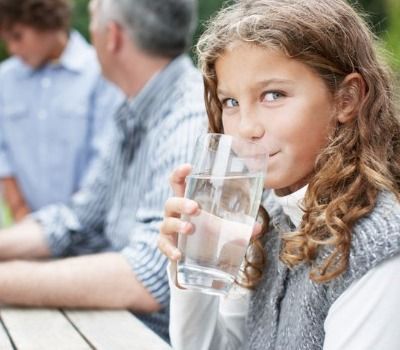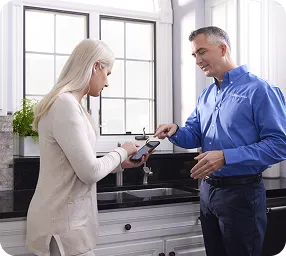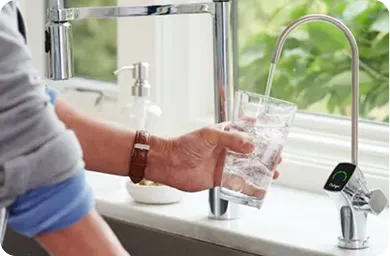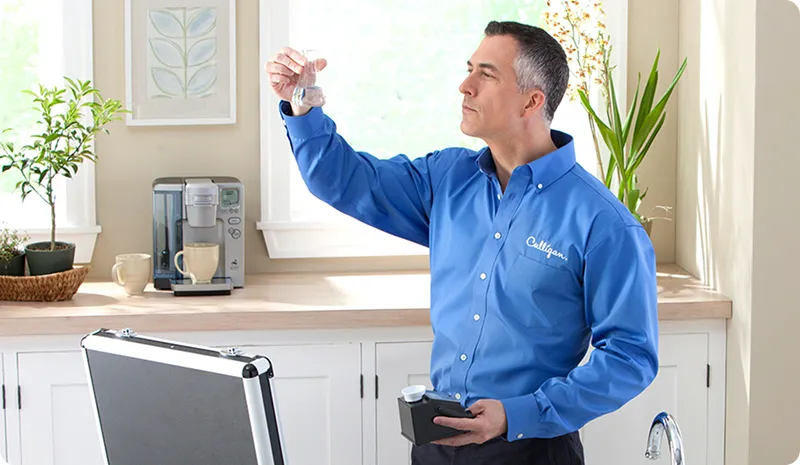Blog
Is Chlorinated Water Safe to Drink?
Published: January 31, 2026

When you think of the chemical chlorine, perhaps you think of swimming pools, paint, or cleaning products. But, chlorine also exists in the water you use to bathe, clean, and hydrate. When present in water, it is often referred to as chlorinated water. Worried how it can affect your health? Here’s everything you should know about chlorine in your home’s water supply.
Does Your Home Have Chlorinated Water?
If you’re unsure about the elements in your water, it may be time to look. For a general synopsis of your water’s health, check the EPA’s yearly Consumer Confidence Report. Discover where your water is coming from and what impurities are hiding within it. For more precise results, get started with a free in-home water test from Culligan. Results will reveal traces of chlorine, heavy metals, and other impurities that can put you in danger.
Why Is There Chlorine in Water?
Chlorinated water is nothing new. In fact, it’s been around since the early 1900s and arose as a medical breakthrough. At the time, waterborne diseases like cholera, typhoid fever and hepatitis were taking the lives of thousands of Americans. To combat the devastation, water distributors turned to chlorine which reduced the harmful bacteria causing these illnesses. After much success, chlorine continues to provide an affordable and sizable solution to disinfecting water supplies around the nation.
So, how does chlorine disinfect the water? It attacks the cell membrane of harmful bacteria. In turn, chlorine suspends cell respiration and DNA activity – both of which are required for survival. The process of chlorination occurs during the first and final step of the water treatment process. When water first enters a treatment facility, chlorine can help eliminate aquatic life like algae and weaken elements like iron and magnesium. At the end of the process, chlorine helps to disinfect the water and ensure enough chlorine is present to survive throughout the distribution process. Depending on your water’s treatment facility, different levels of chlorine may be found in your water supply.
Can You Drink Chlorine Water?
With water treatment plants readily adding this chemical to local water supplies, many homeowners are left wondering – is chlorine in water bad for you?
Due to the low concentration of chlorine in most home water supplies, drinking chlorine-contaminated water is not of grave concern. That said, chlorinated water may taste and smell like bleach or chemical residue. The potency of these effects may vary depending on your home’s proximity to the water treatment center.
When possible, avoid consuming overly chlorinated water. Side effects can vary but often include asthma attacks for children and long-term health risks for adults. Better protect yourself by drinking dechlorinated water whenever possible. While you may not be able to control the water you drink outside of your home, you can inside.
What Can You Do to Lower Chlorine in Drinking Water?
To lower chlorine in your drinking water, you’ll need to remove the chemical from your water supply. Water filters like Culligan’s Water Filtration Systems do the hard work for you while providing your whole home with total protection. With an all-in-one water filter, achieve cleaner, fresher, better tasting water from every faucet in your home with ease. Contact Culligan Water today to schedule a consult or an installation appointment.





